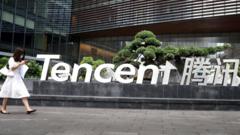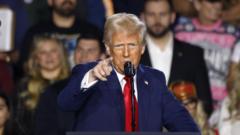Tencent and CATL, significant players in the tech industry, have been included on a US list indicating affiliations with China's military, prompting strong denials from the companies and raising concerns about trade relations amidst mounting geopolitical tensions.
US Includes Tencent on Military Affiliates List Amid Rising Tensions with China

US Includes Tencent on Military Affiliates List Amid Rising Tensions with China
The US has added Tencent and CATL to a watchlist of companies linked to China's military, escalating economic tensions.
The United States government has officially added tech behemoth Tencent and battery manufacturer CATL to a forthcoming list of companies believed to collaborate with the Chinese military. This list, aimed at safeguarding US businesses and organizations from potential risks associated with investing in Chinese firms, does not lead to an immediate ban but increases scrutiny, potentially urging the US Treasury to impose sanctions on the said companies.
Tencent, a powerhouse known for its messaging app WeChat, and CATL have both firmly rejected any claims linking them to the military sector. The Chinese government has vocally criticized the US's choice, labeling it as "unreasonable suppression" of its businesses.
The Pentagon’s list, referred to officially as the Section 1260H list, is updated yearly and now lists 134 entities. It is part of a broader strategy by Washington to combat what it perceives as China's initiatives to bolster its military capabilities through technological partnerships with domestic firms, universities, and research institutions.
In a public statement, Tencent expressed that its inclusion on the list was a "clear mistake," affirming that the company does not operate as a military entity nor functions as a supplier. Similarly, CATL stated that it is not involved in any military-related activities, calling the designation erroneous.
Liu Pengyu, a representative for the Chinese embassy in Washington, criticized the US actions as violating fair market competition and undermining international trade norms, which could deter foreign investments in the US. This addendum came after mounting pressure from US lawmakers who propelled the Pentagon to revise its list, notably with Ford announcing a $2 billion investment in a battery plant in Michigan while intending to license technology from CATL.
In the backdrop of escalating economic tensions, former President Donald Trump, known for his hardline position against China, is expected to commence his term again this month.
Notably, last year, the Pentagon faced litigation from drone manufacturer DJI and lidar technology company Hesai Technologies when they were both included in the outlined list, which remains unchanged in the latest iteration.






















